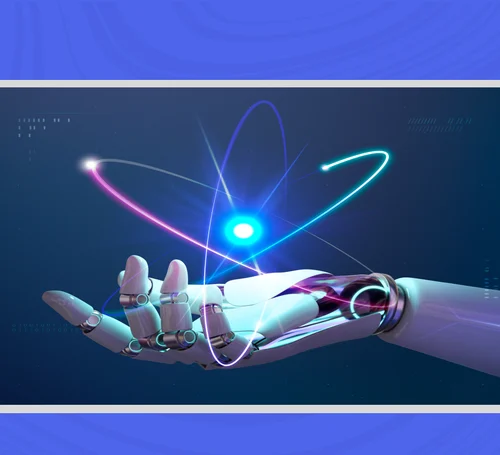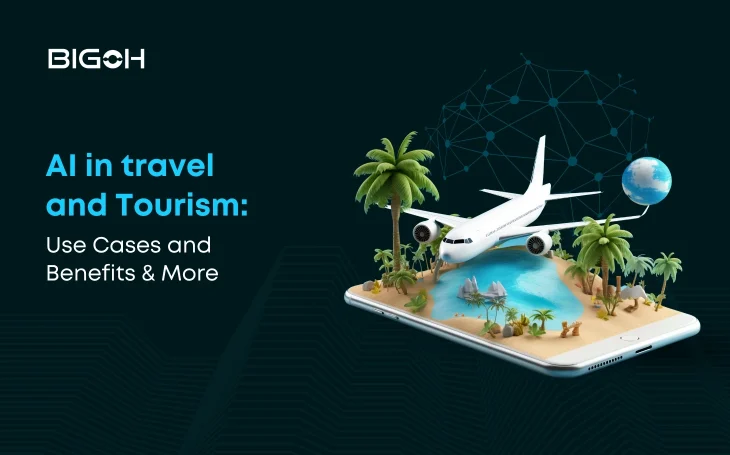
Are you a travel and tourism business struggling to manage piles of traveler data, enhance customer experience, and improve your business revenue?
Artificial intelligence has been a game-changing technology for travel and tourism businesses for many years now.
Whether you want to provide customized travel recommendations, round-the-clock customer support, or automate your administrative tasks, believe us, AI can help you with that.
In this blog, we’ll cover everything about how AI impacts the travel and tourism industry and its future 10 or 15 years down the line.
Market Statistics of AI in the Travel Industry
Just like AI made its dominance in other industries such as retail, entertainment, and healthcare, so like travel and tourism are no such exception.
Essentially, AI redefines the travel and tourism landscape, and today companies are using AI-powered technology to enhance the customer experience, streamline their operations, and provide personalized travel recommendations to travelers.
A study from Precedence Research states that Generative AI technology is making BIG waves in the travel and tourism sector. It’s because of the following reasons-
- It makes travel services more accessible to consumers.
- It provides personalized travel recommendations to users when booking flights, hotels, and other services.
- It smoothens the workflow of travel companies.
The market size of Generative AI in travel was USD 632.18 million in 2022 and it’s continuing to grow by USD 3581.95 million by 2032.
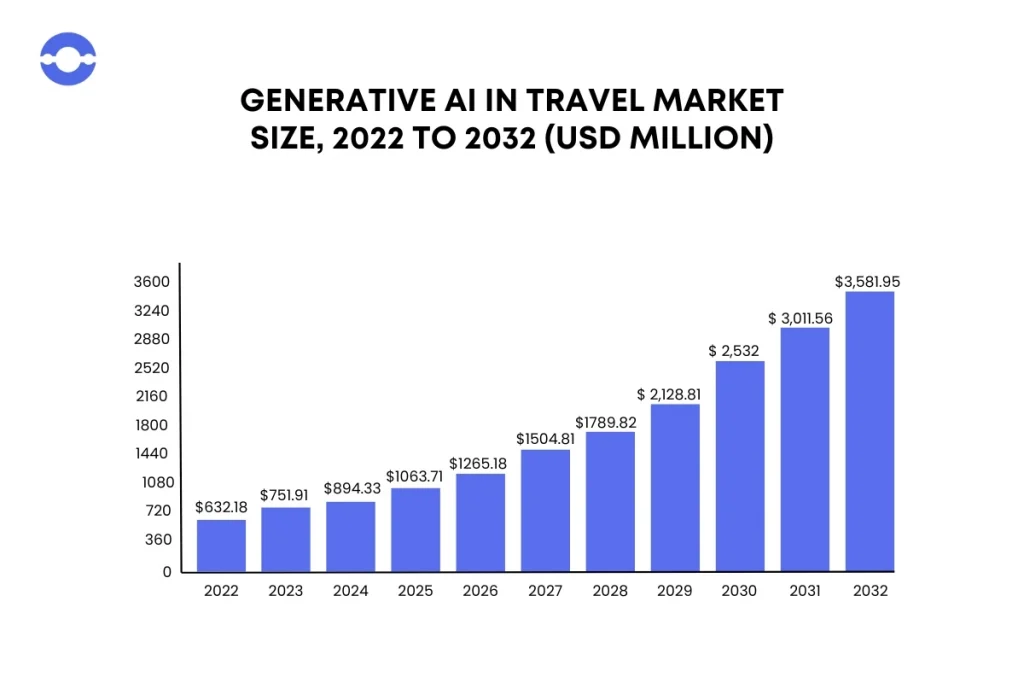
According to the World Metrics Report, here are a few statistics that highlight how AI revolutionizes the travel and tourism sector-
- 61% of travel companies plan to integrate AI in the next 3 years in their work processes to enhance customer experience.
- 83% of travel companies feel that AI is the distinguishing factor that drives innovation in the industry.
- AI acts as a companion for travel companies and it’s expected that it’ll increase tourism revenue by 10% and reduce costs by 15%.
- AI-powered chatbots aren’t mere digital assistants for answering repetitive questions, rather these are guides for exploring destinations. By employing these chatbots, tourism companies save around $8 billion annually in 2022.
How is AI changing the travel and tourism industry?
AI revolutionizes the travel and tourism sector from creating personalized vacation plans for tourists to rising demand for AI travel agents.
A McKinsey study states that AI can generate immense value, ranging from nearly $2 trillion to $4 trillion, for travel businesses.
1. Personalizing travel experiences
One of the major use cases of AI in the travel and tourism sector is that it uses machine learning algorithms to store customer preferences such as travel history, browsing behavior and social media activity.
Then it suggests personalized recommendations for travelers as per their preferences such as popular travel destinations, tourist spots, restaurants, or finding the best hotels for travelers.
As AI can even store traveler’s history, it enhances customer experience by offering customized travel plans so that travelers love to book through your platform.
2. Facial recognition
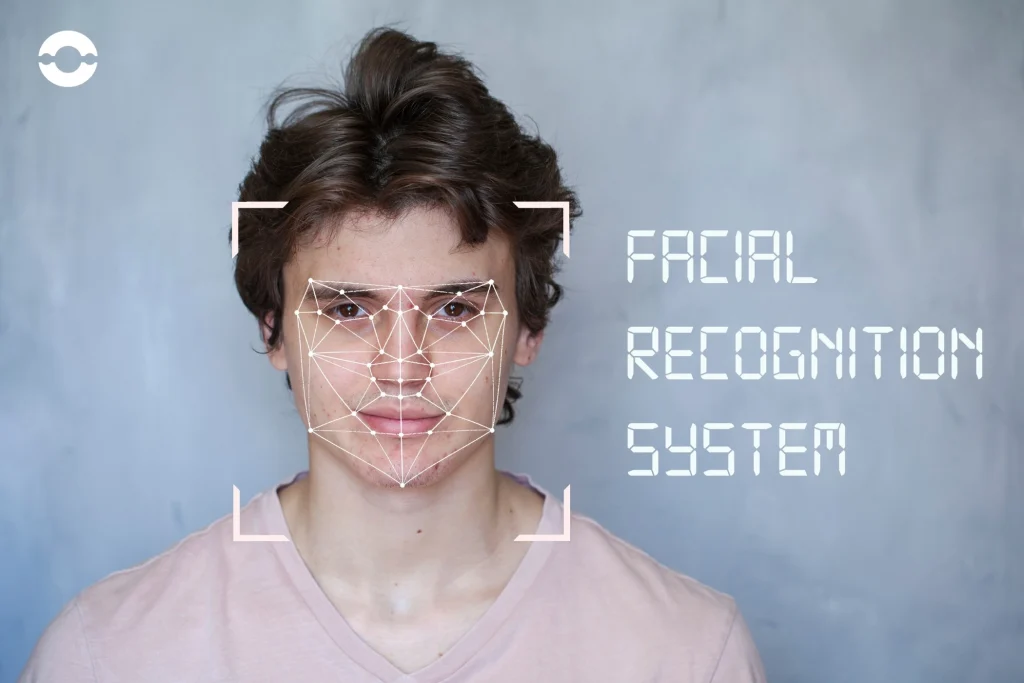
Manually verifying the person’s identity can take a huge deal, especially when the hotel is dealing with an insane number of customers.
Facial recognition technology is a GOLDMINE for travel and tourism businesses. Deploying these systems at airports, hotels, and restaurants can speed up identity verification.
Facial recognition is a biometric feature that uses AI to detect human faces and skin textures by comparing them against visual images stored in the database.
This will save customers time, and it can become a potent tool for hotels and airports as they can provide access to specific groups of people. Thus, they’ll also be sure of the guest’s identity.
The manager of Munich Airport says that their passengers are happy when they use the biometric system. Passengers no longer need to search for boarding passes in their wallets as biometric technology will verify their identity and they can simply walk through the gate.
3. The use of AI chatbots
The traditional travel booking process was a daunting task as the clients had to contact travel agencies or talk to agents to make a booking.
However, the introduction of smart booking assistants or AI chatbots eases the booking process.
Travel chatbots are not merely digital assistants, they’re the true companion for guiding travelers from flight bookings to finding a perfect hotel. They provide 24*7 support to travelers, personalize customer’s journeys, and can handle repetitive questions.
They never get tired, nor do they sleep, unlike human agents. That’s why 37% of users prefer interacting with AI chatbots for comparing travel plans or making bookings hassle-free.
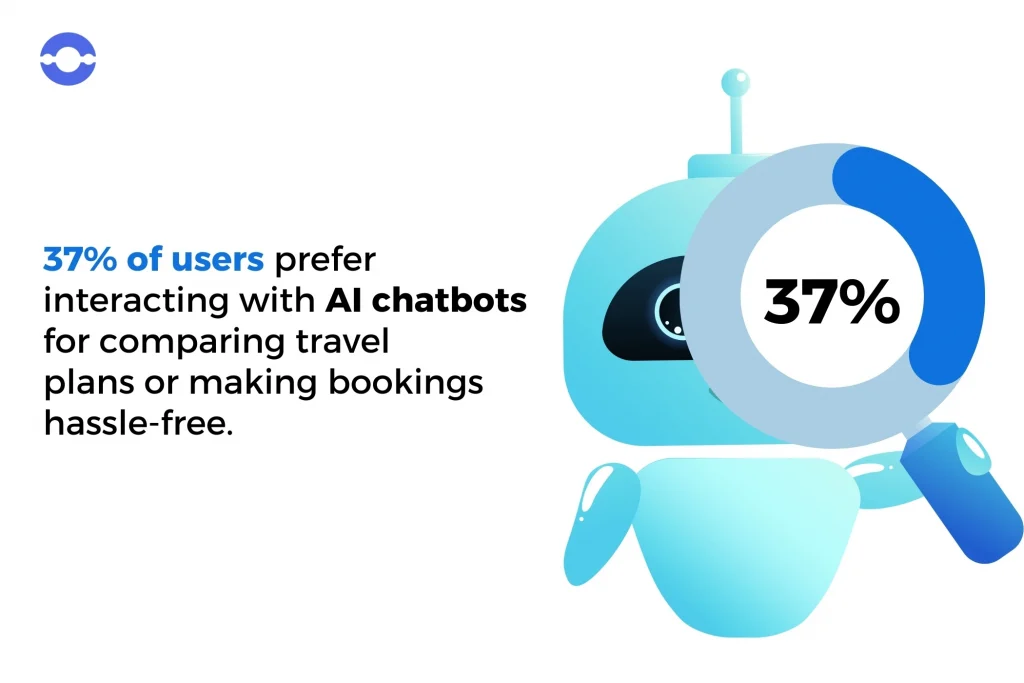
Expedia Group, for instance, is the largest online travel platform that uses AI-based chatbots to simplify the travel booking process. They use AI/ML algorithms to assist customers, so they get real-time information about flights, and hotels and fulfill their travel-related needs.
4. Flight forecasting
AI acts as a catalyst for airline companies and helps them with flight forecasting such as whether there is a delay in flights or if are they canceled.
As AI analyzes historical data, it can predict weather conditions and traffic volume. This will help airline companies to schedule the trips and passengers can manage trips accordingly.
United Airlines for instance use the AI-driven system to optimize their flight routes and inform the passengers in advance even if there’s a little delay in flight by a few hours or days.
These systems are useful for predicting delays because of bad weather conditions or other uncontrollable variables. This way, it doesn’t affect the passenger experience.
5. Baggage handling processes
In the travel and tourism sector, AI is immensely valuable for handling baggage processes. Because it uses advanced tracking capabilities, customers don’t need to worry about baggage getting lost or misplaced.
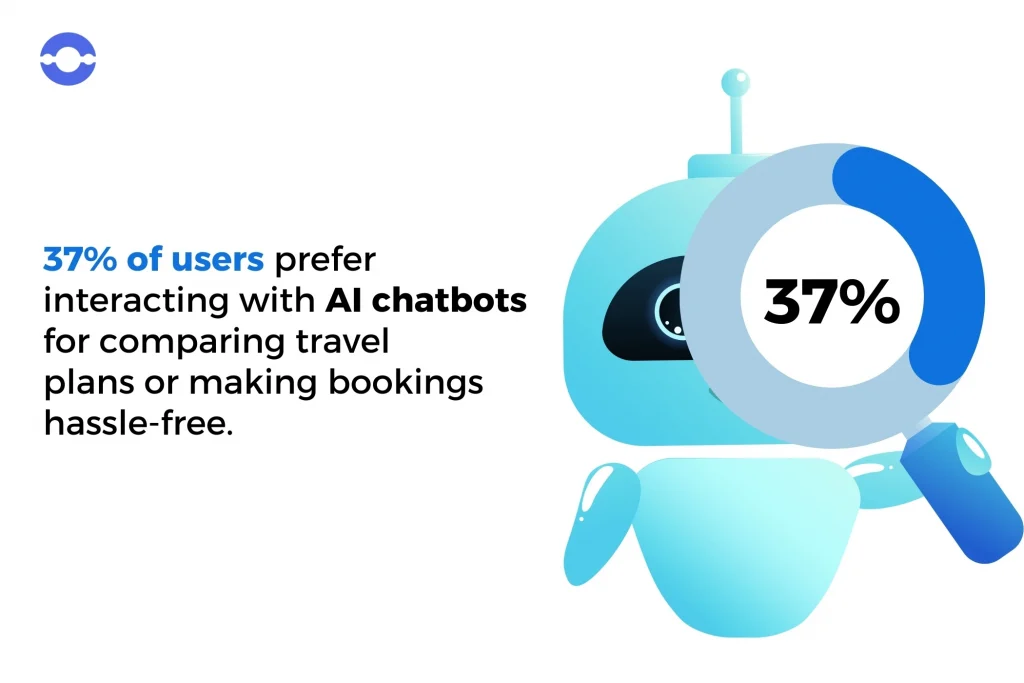
Initially, the major troll back for air travelers was to find lost or misplaced luggage. Sometimes they have to wait for long hours to get the luggage. As per the US Department of Transportation, US airlines mishandled around 1.6 million bags during 2022.
Thus, it not only creates financial losses for passengers and airlines, rather it also increases customer dissatisfaction. It makes them more frustrated than ever.
For this, AI-powered systems are used for tracking the status and location of bags. Thus, customers won’t feel disappointed with their luggage from check-in to the final stage. At times, it can alert security staff if anything is suspicious.
6. Self check-in and check-out
Traveling is no longer a boring and time-consuming process; it has become a pleasure for travelers. Hotels use self-check-in and check-out systems where travelers need not wait at the front desk.
Travelers can now use smartphones to check in /out and complete their formalities.
The check-in process has become contactless, seamless, and convenient for them.
Premier luxury hospitality brands such as Mariott, Wyndham, Hyatt, and Hilton use contactless technology. They believe that it has become an important pillar of the hospitality industry.
Top travel and tourism Companies using AI solutions
Let’s discuss a few examples of popular travel and tourism companies that are making strides using Artificial intelligence –
1. KAYAK
KAYAK, being a leading travel company, uses advanced AI/ML algorithms to ease the booking process for travelers. It stores the data of travelers, their preferences, and their past travel history in one place and then suggests personalized travel recommendations.
Unlike other travel sites, KAYAK experiments a lot with AI to suggest the best hotels, rental cars, and flights to customers at affordable prices. Its powerful AI features guide travelers when to book a flight ticket or plan their trip and get the most out of it.
2. Hyatt
The leading hospitality chain, Hyatt launched AI-powered beds to provide a quicker and longer sleep experience to guests.
The bed analyzes temperature, heart, and respiratory rate, stores sleeping patterns, and adjusts temperature per weather conditions to provide a high-quality sleeping experience.
The focus of the hotel is to improve the overall well-being of guests so that they feel rejuvenated.
3. Booking.com
Booking.com is the leading online travel agency that integrated AI into its platform called the Trip Planner.
Travelers can ask a series of questions from AI, and it will curate personalized travel plans depending on traveler needs and preferences, demographics, search history, etc.
The AI-powered algorithms use dynamic pricing strategies considering various factors such as demand, availability, market trends, competitor pricing, etc. so that accommodation providers can maximize their revenue.
4. Airbnb
Airbnb, a short-term rental company leverages AI technology to enhance the guest experience.
The company uses predictive search to provide appropriate rentals by considering traveler preferences, other dates, and past travel history. This way it enhances the customer experience.
While on the host side, it uses AI-powered pricing tools to suggest the best possible price that the host can charge from its guests. It calculates the price of rental based on demand, location, seasonality, competitor prices, and past booking trends.
Thus, hosts can maximize their earning potential and get more bookings for their accommodation.
5. TripAdvisor
TripAdvisor is a travel guidance platform meant to help travelers search for the best accommodation deals, reserve tables, and find better restaurants. Travelers can plan their trip no matter where they wish to go and what the trip type is.
The platform uses AI algorithms where users can go on virtual tours to their most loved destinations. They can get immersive experiences while sitting in the comfort of their home.
As Tripadvisor integrated AI into its platform, it keeps track of user preferences and search history and then comes up with the best suggestions for activities to try on when visiting the place, tourist attractions along famous restaurants.
Also Read: AR VR in Travel and Tourism
What are the benefits of AI in the travel and tourism industry?
AI is a transformative force in the travel industry that offers several advantages to businesses-
1. Customized travel suggestions
AI algorithms analyze voluminous amounts of travel data and keep an eye on customer preferences and travel trends to provide customized experiences for people. Such personalized recommendations often save time and effort for travelers.
Moreover, they would be highly satisfied when an AI knows about their preferences inside out that they can’t even imagine. Thus, you can make their journey more comforting.
For Instance – It can create customized recommendations for travelers about the best restaurant they should visit, help them plan their itineraries, manage their travel journey, and even suggest attractions or cities with low traffic that match the tastes of travelers.
2. Better safety and security
AI makes travel more secure. These systems are a game changer for travelers as they can detect suspicious items on the go and alert the concerned authorities.
Not only that, travel and tourism businesses (airlines, hotels, restaurants) are using facial recognition systems and biometric technology to detect fraudulent customers.
It’s not confined to improving the operational efficiency of businesses or delighting customers through better customer service, rather it provides a comforting travel experience to them.
For travelers’ side, check-in processes become quicker and hassle-free as customers can self-check in without waiting at the front desk. At the same time, hotels and airlines can quickly verify the identities of passengers with zero inconvenience.
3. Helps in dynamic pricing strategy
AI helps travel and tourism businesses in setting the optimal pricing strategy that helps them drive in more revenue.
The advanced AI algorithms enable hoteliers and airlines to adapt their pricing strategies by considering competitor pricing, market trends, current demand, seasonality factors, etc.
Additionally, they can make the efficient utilization of resources (staff, inventory) by seeing real-time information as to when and in which season demand will be greater.
Thus, they can set competitive prices during the season of highs and lows and can thrive in an ever-changing travel landscape.
Did you know Airbnb uses AI-powered algorithms to create smart pricing strategies?
Airbnb is a rental platform that acts as an intermediary between property owners and guests. The company integrated smart pricing functionality into the platform. Now, what it does?
It calculates the prices of rental properties in real time by considering factors such as seasonality, property location, competitor prices, demand, etc.
Airbnb states that people who use this AI functionality get more bookings by 4x than those who do not. They experienced an increase in revenue of 12%.
4. Immersive virtual tours (AR/VR)
Of course, physical travel is different from experiencing the place through immersive technologies. Travel companies that offer virtual tours to customers add more value to their lives.
Generally, travelers want to feel the place before visiting, they want to see what the place looks like. That’s possible through virtual travel.
Hospitality companies like Maldives wanted more hotel bookings. They used AR/VR technologies to provide a “try before you buy “experience.
They can highlight some of the best features of their hotel such as the swimming pool, nearby restaurants, or water park.
Guests can enjoy the 360-degree view of the hotel and explore the scenic beauty of that place before booking.
What’s the future of AI in the travel and tourism Industry?
Travel requires a human touch, it’s an altogether different experience. The blend of AI in travel and tourism can be a game changer for tourists and companies in this space.
The future is looking promising ahead because traveling has always a time-consuming task for travelers when planning for vacations.
According to Carie Tharp (Vice president of Google Cloud), the next 20 years will be not like the previous 10 years. For travelers, AI has become a source of inspiration that provides personalized travel recommendations.
The market growth rate of the travel and technology industry was $9.4 billion in 2022, and it’s expected to touch $21 billion in 2032.
Such impressive growth is due to the advancement of AI and contactless technology.
Here’s what the future of AI looks like in travel and tourism –
- Travel companies will now emphasize deep learning technologies that provide accurate predictions on occupancy. Thus, they can effectively utilize their resources, maximize revenue, and earn more profits.
- There will be hype in biometric verification methods such as facial recognition. Airports will be investing more in this technology and require passengers to go through biometric verification checks.
- Travel Companies will invest in GPT technologies or develop their generative AI platform to provide language translation services.
- Hyper personalization is on the rise. Companies are using data analytics to analyze complex datasets and create personalized trip suggestions for travelers or help them plan their itineraries. Moreover, they will soon run personalized ads, create customized pricing strategies, and offer insurance support for travelers.
Wrapping up
The above guide gave you a detailed walkthrough on how leveraging this game-changing technology (AI) brings various benefits to your travel and tourism business.
Some of these include –
- Customized travel suggestions
- Dynamic pricing strategy
- Immersive AR/VR travel tours
- Better safety and security
YY Sng, head of the country at Azgo states that AI adoption provides positive benefits for the travel sector. Gen Z and Millennials are so excited while using this technology as they save significant time and effort while planning their vacations.
He further said – “The AI-powered search engines increased hotel bookings by 33%.”
Where customers demand personalized recommendations, that’s what is driving the growth of this sector. Of course, AI will not replace human touch, but there are many areas where it can aid travel companies during the most stressful hours.
As a leading AI/ML development agency, we know how to transform your business with innovative solutions such as chatbot development, generative AI solutions, machine learning solutions, Facial recognition, etc.
We have a dedicated team of AI engineers who can understand your business requirements and create a digital product that streamlines your business processes and enhances your workflow.
Related Post

Machine Learning in
Machine learning (ML) has been making strides in consumer-facing businesses....



